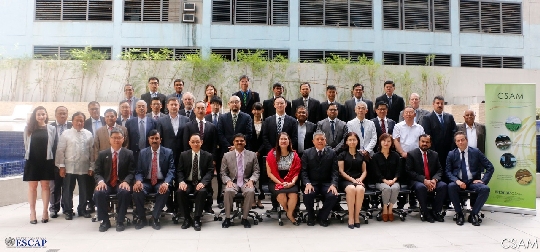4th ANTAM Annual Meeting – Manila, The Philippines

Sixteen countries at a United Nations forum in Manila, Republic of the Philippines, have reviewed and adopted in principle a new set of safety and quality standards for agricultural machinery manufactured, traded and utilized in the Asia-Pacific region. Increasing agricultural productivity and incomes as envisaged under the Sustainable Development Goals (SDGs) requires mechanization of farm operations to simultaneously address production gains and environmental protection. To attain the relevant SDGs, it is crucial to support the adoption of technologies that maintain high yields while at the same time reduce the use of chemical fertilizers and minimize the environmental footprint of agriculture. The standards developed by the ‘Asian and Pacific Network for Testing of Agricultural Machinery (ANTAM)’ initiative led by the Centre for Sustainable Agricultural Mechanization (CSAM), help to reduce the social and economic costs associated with the use of unsafe and substandard farm machinery, while improving the environmental sustainability of farming operations.
Organized by CSAM, a regional institution of the United Nations Economic and Social Commission for Asia and the Pacific (ESCAP), the 4th Annual Meeting of the Asian and Pacific Network for Testing of Agricultural Machinery (ANTAM) was co-hosted by the Agricultural Machinery Testing and Evaluation Center (AMTEC), College of Engineering and Agro-Industrial Technology, University of the Philippines Los Baños from 22 to 24 November, 2017.
At the opening ceremony, Engr. Cristy Cecilia P. Polido, Interim Director, Bureau of Agricultural and Fisheries Engineering, Department of Agriculture (DA), Republic of the Philippines emphasized the importance of testing Codes for agricultural machinery to provide end users with reliable and safe equipment. Moreover, Engr. Polido emphasized the timeliness and relevance of the ANTAM initiative to the process of agricultural modernization that is ongoing in the Philippines.
The Annual Meeting elected the Philippines as the Chair for 2018 and Indonesia as the Vice Chair for 2018. In addition, the meeting reviewed and agreed upon several procedural aspects, including roles of key entities involved, in a new, proposed ANTAM certification system.
By establishing a functional certification system, this CSAM standard-setting initiative will facilitate cross border trade of agricultural machinery and contribute to reducing transaction costs, enhancing transparency and promoting fair trade. Regional integration is at the core of ESCAP’s mandate and the ANTAM Codes represent a unique regional effort in coordinating the work of various players in the field of testing of agricultural machinery. To this end, the meeting involved representatives from agricultural machinery manufacturer associations as well as national governments, and research and testing institutes.
As part of the programme, a field trip was also organized on the last day to expose participants to local good practices and enable sharing of experiences.
